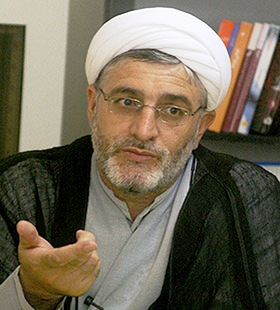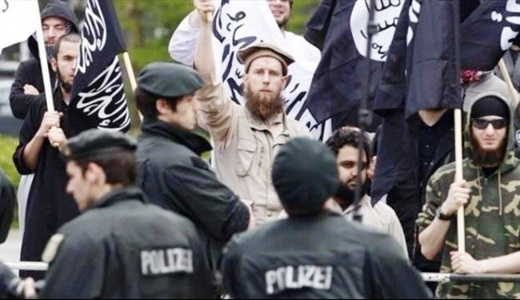
Dr. Davood Feirahi, a political science researcher, says that ISIL has its roots inside the Muslim community, blaming a lack of religious development among Muslims for the emergence of radicalism at this level.
On October 12, Khabar Online posted an analysis of the current state of affairs in the Middle East followed by an interview with Dr. Feirahi which mainly revolves around the emergence of the Islamic State of Iraq and the Levant and the crisis which has swept the region. The following is PART ONE of the translation of the analysis and the Q and A:
ISIL has created a situation in the Middle East as a result of which many are offering prayers for the soul of [Osama] bin Laden, viewing Al-Qaeda as an organization far more honorable than the so-called Islamic State (IS). The sympathizers of Abu Bakr al-Baghdadi, the self-proclaimed Caliph of Muslims, have painted a new image of radicalism for the people around the world, portraying an extremely distorted picture of Islam in civilizational and religious concepts.
Different theories have been floated to explain the reasons behind the formation of such a dangerous phenomenon, and, as it is usually the case, the most striking and perhaps the most popular one is this: blame all problems on the enemy and denounce the West, the US in particular, as the mastermind of the recent crisis which has swept the Middle East, a precarious trend which seems unlikely to be confined to the Middle East.
However, Dr. Davood Feirahi’s take on that question differs. He is, for sure, one of the greatest, if not the most outstanding, professors of the Islamic political thought in Iran. Feirahi, a University of Tehran professor who had come to Café Khabar [the venue for holding interviews as well as exclusive and analytical round-tables at Khabar Online], argues that ISIL has taken roots inside the Muslim community, saying that failure on the part of Muslims to become developed religiously has given rise to radicalism allowing it to grow extensively.
Hojatoleslam Feirahi maintains that airstrikes unleashed by the US and its allies only help radicalism spill over, and this complicates efforts to keep the extremist current in check.
He underlined that to counter ISIL, Muslims should change their religious conduct. Such a change of heart should allow the opposing currents inside the governments to speak their mind, force authoritarian states to involve people in the administration of their homelands’ affairs, and ask various religious currents to do more to promote tolerance and moderation among themselves.
The Arab Middle East has turned into the cradle of religious extremism in the world, a region which is today witnessing Middle Ages-like behaviors. Various theories have been floated to explain why such a phenomenon has emerged, but these societies seem to have developed a special interest in extreme acts and radicalism. Why do the extremist theories resonate with people in the Middle East?
The Middle East is a special region and its governments and movements do not fit into any category. A separate file should be specifically opened for this region. The reason: this region is [viewed as] hegemony in the world. It means that global powers have interests in it, and events in this region soon translate into domestic developments in world powers.
It has caused the Middle East to be always gripped by interference, which either shapes a new order or disrupts the old world order. There are three reasons for this quality of the Middle East.
The first has to do with geopolitics. Needless to say, the Middle East carries much weight from this perspective. Secondly, this region’s economy and its oil are also an issue, and last but not least is the fact that this region is a place where a large number of emigrants head for the outside world; that is to say, crowds of people hailing from this region are living in developed countries such as the US, France, England, etc. These immigrants are the reason why any crisis in the Middle East can spread into developed world.
The three questions explained above are the reasons why this region has been globalized. Another important point is that the governments which have risen to power in this region have been extremely military, more or less secular and somewhat failed.
There are two problems associated with a failed state; first, it controls society and under the pretext of establishing social justice does not allow the democratic process to run its course. Moreover, the organization of their institutions allows corruption to thrive. Consequently social justice fails to prevail in society.
These states are failed whether they are religious or not. What matters is that these systems have, for some reasons, activated forces who tended to be part of the corridors of power, but have denied them the opportunity to flourish.
To elaborate more, I should say that the Iranian people used to not interfere in the administration of affairs prior to the Constitutional [Revolution] because they did not see it within their rights to get engaged. With the passage of time as national governments rose to power, people still remain unable tobe part of their country’s national and public affairs not because they don’t see it their right to do so but that they are not allowed to.
The non-interference in these two cases is not of the same nature. The latter has sparked off the radicalization of [political] currents, or has caused them to have secular leanings or radical religious tendencies. Religious currents are drastically radical because the failed states have had secular orientations. That’s why resistance found its way to the religious literature and words such as Jihad, Takfir [one Muslim declares another an unbeliever] and Hejrat [departure or emigration] were given added weight.
Mulling over how the concept of Jihad was put into active use during the course of history, we come to a point in time when [Anwar] Sadat and [Hosni] Mubarak were leading totalitarian regimes, and it could even be extended to the final days of [Gamal Abdel] Nasser [in Egypt].
Thus, we can hold up the hegemonic nature of the region and the presence of failed states as the two significant reasons why regional movements are playing a more active role. When the failed states are given support by the outside powers, the opposition makes use of religious literature in the first place; and secondly in launching an offensive against regional governments it attacks their Western supporters too.
It could be said that the connection between authoritarian systems in the region has manifested itself in two ways: opposition to the West and opposition to regional governments, which are the social and political foundations of radicalism in the Middle East.
The religious literature you just talked about could be acceptable, but the question that arises here is: What pushes such religious literature to opt for violence and radicalism?
People in the region have, for long, tried to advance their own will through ballot boxes, but this has proved a failure in most of the countries. Let me illustrate my point with the Algerian example or a Syrian crackdown in 1986, riots in Saudi Arabia, the recent crisis in Egypt, and the like.
You can see that the public will have always met with a heavy hammer. The hammer here has been a military force with no justification. This shows that radicalism has fallen asleep in countries where the governments are more likely to open up the [political] atmosphere.
Accordingly, I see a clear link between the [emergence of] ISIL, the failure of Mohamed Morsi [in Egypt] and the current crises in Libya. In most of these countries democratic efforts failed to serve as a [fitting] template to channel the energy the opposition was emitting. They failed. This energy is like a closed pot [on the stove]. They would, in the end, find some justification [for their failure] and that justification here comes in the form of radicalized measures rooted in religion.
If we seek to establish a relationship between a religious government and a secular state, we come to the conclusion that the two models have been both unsuccessful. Neither religious governments nor secular systems have fared well. In both models people have not played a remarkable role in the political process, and the two models ultimately lead to the rise to power of totalitarian dictatorships. What is the root of this?
This hinges mainly on the nature of governance in the Middle East and it doesn’t matter whether it’s religious or non-religious. When it comes to the religious model, experience has shown that as long as the governments in the region are led by Shiites, it can provoke a backlash among the Sunnis. In other words, the latter comes up with its own solution which is the formation of non-religious authoritarian governments led by Sunnis. Therefore, they seek an anti-Shiite and anti-Western version [of government].
There are no precedents for this. At the time of Al-Qaeda [when it was spreading terror across the world] the fight against Shiites hadn’t reached this [alarming] proportion. They were trying to portray the family of religion as an interrelated and united system.
I think it was predictable that radicalism was gathering pace. The current crackdowns rekindle the spread of radicalism. US airstrikes would not bring radicalism under control; rather they would create small uncontrollable cells which couldn’t be monitored. Radicalism seems likely to make a comeback to Europe and the US.
Experience suggests that concentration is to the detriment of these groups. They are again heading for Europe and we should wait for news [of attacks] coming out from towers or metros in Europe. Radicalism has struggled to fill the void created in the Middle East to establish a permanent territory for itself. However, if it senses that it couldn’t be the case, it would change, because radicalism comes with some rationality and it is nowhere near injudicious.
Once radicalism feels that concentration in a geographical location is not the solution, it would expand its efforts to swell its ranks. Although social currents cannot be meticulously defined, the bombing missions [of the US] seem to take the war back into the West.
